Online calls for attacks against Georgia’s LGBTQ community result in offline violence
Anti-LGBTQ, pro-Kremlin groups, and representatives of the Orthodox Church mobilized people online for violence in real life
Online calls for attacks against Georgia’s LGBTQ community result in offline violence
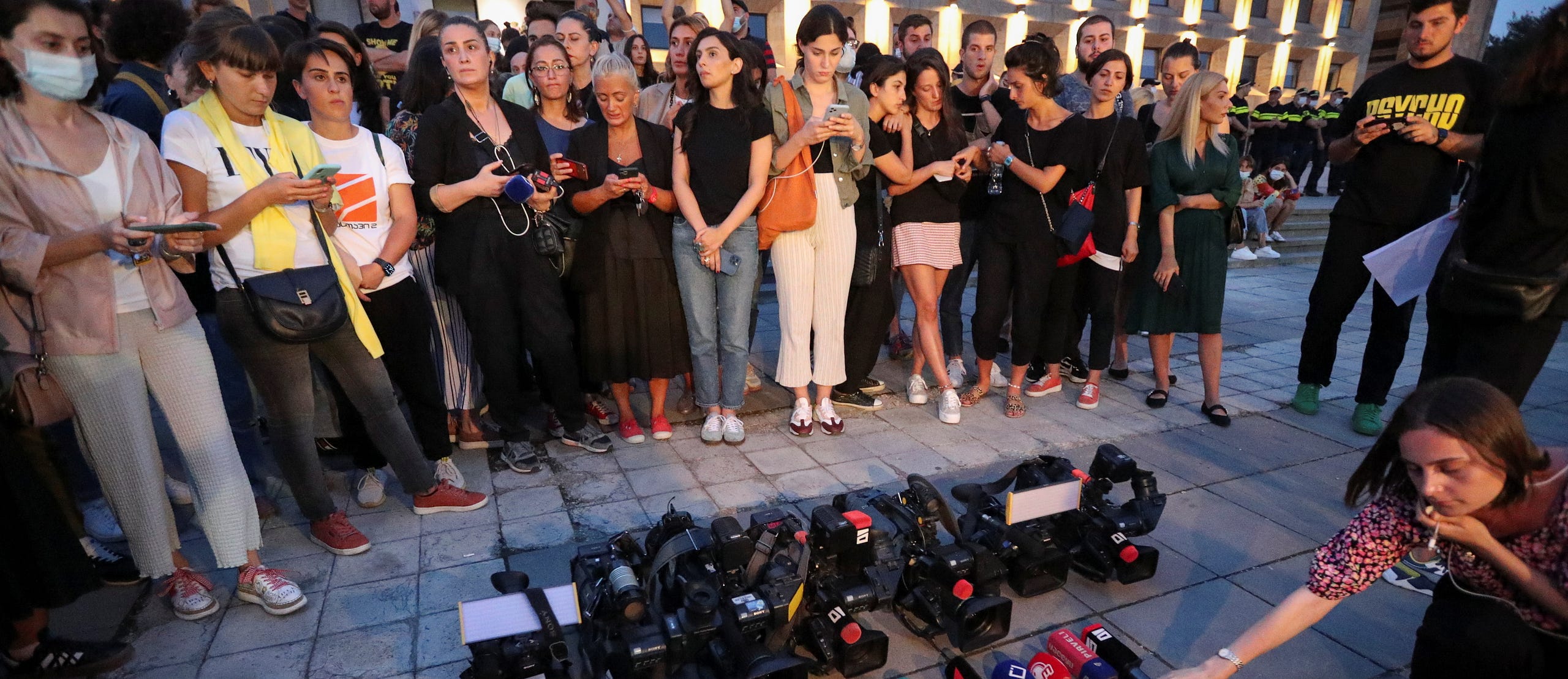
Note: This article includes quotes containing anti-LGBTQ epithets.
Georgian far-right and pro-Kremlin groups, as well as Georgia’s Orthodox church, targeted the LGBTQ community, its supporters, and the West online prior to the “March for Dignity” — a peaceful march by Tbilisi Pride originally scheduled for July 5, 2021.
Following calls for protests and prevalence of hateful rhetoric targeting the march online, homophobic, violent, and pro-Kremlin groups gathered at the location of the march on the day it was to be held. There, they assaulted journalists and targeted supporters of the LGBTQ community. Citing a lack of safety guarantees by the Georgian government, headed by the Georgian Dream party, Tbilisi Pride ultimately canceled the march.
Background
Ahead of the Pride celebration, leaders of the anti-LGBTQ groups asked their followers to show up and confront the LGBTQ community and their supporters, often calling directly for physical harm. Meanwhile, the march received no support from Georgian Prime Minister Irakli Garibashvili, who instead tacitly contributed to tensions by saying that the march was “unreasonable” and organized by “radical opposition” political parties.
On July 5, when the March for Dignity was to take place, a violent mob encouraged and organized online by far-right actors and pro-Kremlin groups assembled in front of the Georgian Parliament. They stormed the offices of the Tbilisi Pride organization and youth-led Shame Movement, both organizers of the march. Elsewhere, a Polish man was stabbed with a knife in an alleged homophobic assault because he was wearing an earring. By the end of the day, more than 50 journalists had been attacked. Among those assaulted was Alexander Lashkarava, a cameraman for TV Pirveli, who suffered fatal injuries to his face, succumbing to the injuries several days later. The day after the attack, the same violent groups also took down and burned the European Union flag outside the Parliament of Georgia.
In the aftermath the violence, many Georgian civil society organizations (CSOs) demanded “the immediate resignation” of the prime minister, along with Minister of Internal Affairs Vakhtang Gomelauri. The CSOs stressed that too few police had mobilized the night of the attacks; that authorities had not provided adequate public safety; and that, to the contrary, the government had instead “encouraged the violence.” Separately, in the aftermath of Lashkarava’s death, thousands of protesters assembled outside Parliament to demand not just the resignation but also the prosecution of Prime Minister Garibashvili and his government. Among those leading the protests were members of the media. Also in response to Lashkarava’s death, four television channels went off the air for one day, demanding justice for the victims of the mass violence and the resignation of the prime minister.
Local organizations and members of the international community condemned the violence in Tbilisi, saying that Georgia’s leaders and law enforcement must protect constitutional rights and prosecute those involved in the violence. Reporters Without Borders dubbed the violent attacks “a major setback for press freedom in Georgia,” saying media representatives “sustained injuries that included concussion, chemical burns and broken arms.”
U.S. Ambassador to Georgia Kelly Degnan criticized Garibashvili’s lack of “forceful leadership” in handling the violence and hinted at the Kremlin’s influence in stoking the violence, stating, “Those people who want to incite violence here, create instability, are busy at work, doing the Kremlin’s work, to cause dissension, cause instability here in Georgia.” In a follow-up statement, Ned Price, spokesperson for the U.S. Department of State, mentioned the possibility of imposing sanctions “to hold accountable those responsible in some way for human rights abuses.” The European Union delegation to Georgia and embassies for the EU’s member states released a letter indicting the Georgian government for its failure to let participants of the march exercise their right to peaceful assembly and freedom of expression, highlighting “the increasing the vulnerability of Georgia’s democracy, already faced with significant disinformation challenges.”
Far-right group Alt-Info mobilized supporters online
Alt-Info, a Georgian far-right group that camouflages itself as a legitimate media entity and that has strong ties with pro-Kremlin Georgian tycoon Levan Vasadze, was the main force behind mobilizing hate groups against the March for Dignity.
Despite several prior Facebook takedowns, Alt-Info has continued to create new Facebook accounts, groups, and pages. On July 1, the day that marked the launch of Pride Week in Georgia, Facebook once again removed Alt-info assets. That, however, did not prevent the continued amplification of Alt-Info content. In a video published as original content to many anonymous pages on Facebook, Zura Makharadze, one of Alt-Info’s leaders and a key instigator of the July 5 violence, called for those watching to gather in Tbilisi’s center on July 5 to suppress the Pride festivities.
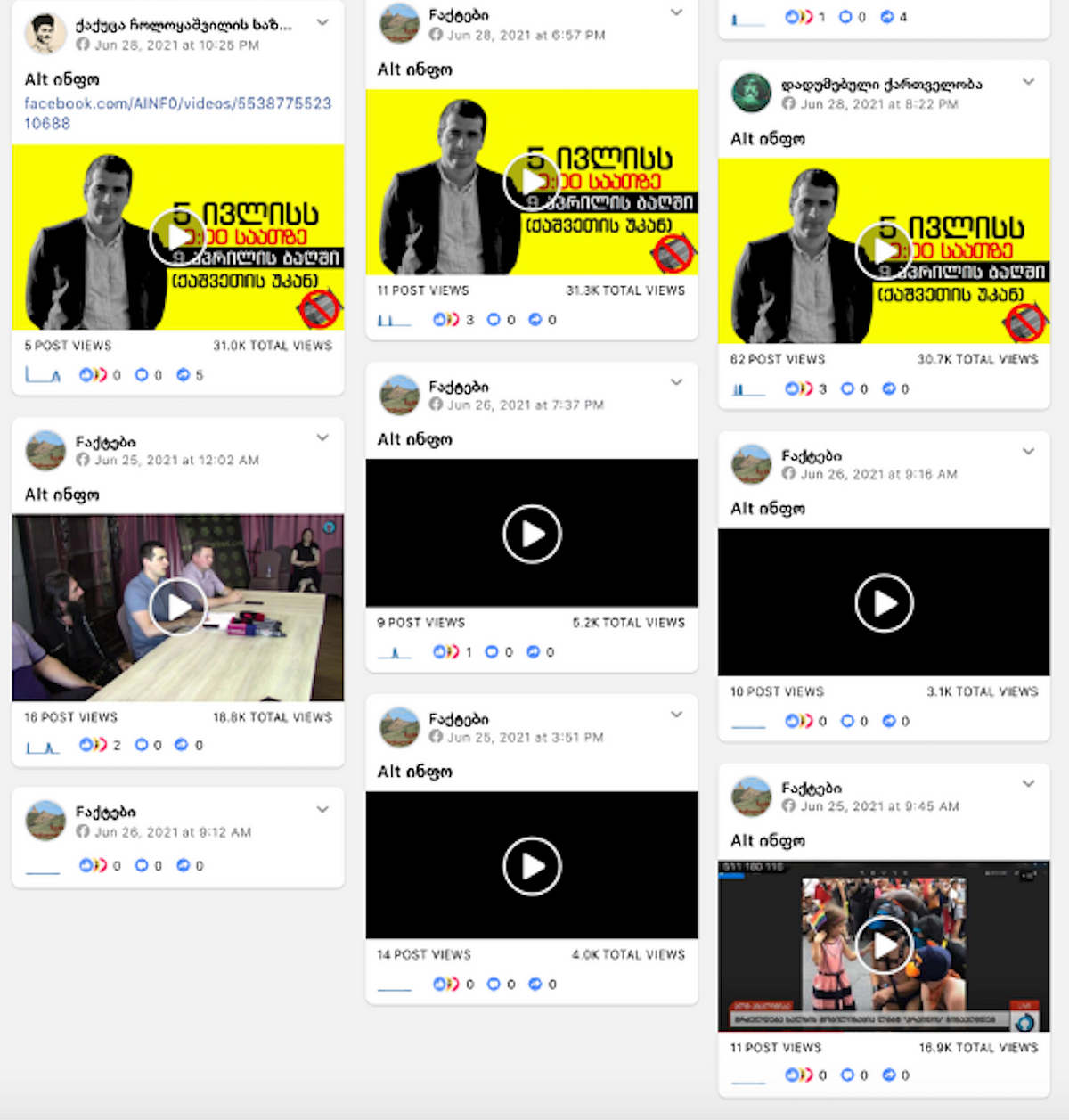
After an earlier Facebook takedown in 2020, Alt-Info also started to migrate to other social media platforms and encrypted messaging apps. Ahead of the March for Dignity, for example, Alt-Info mobilized its supporters through a Telegram group with more than 2,000 members, as well as on TikTok.
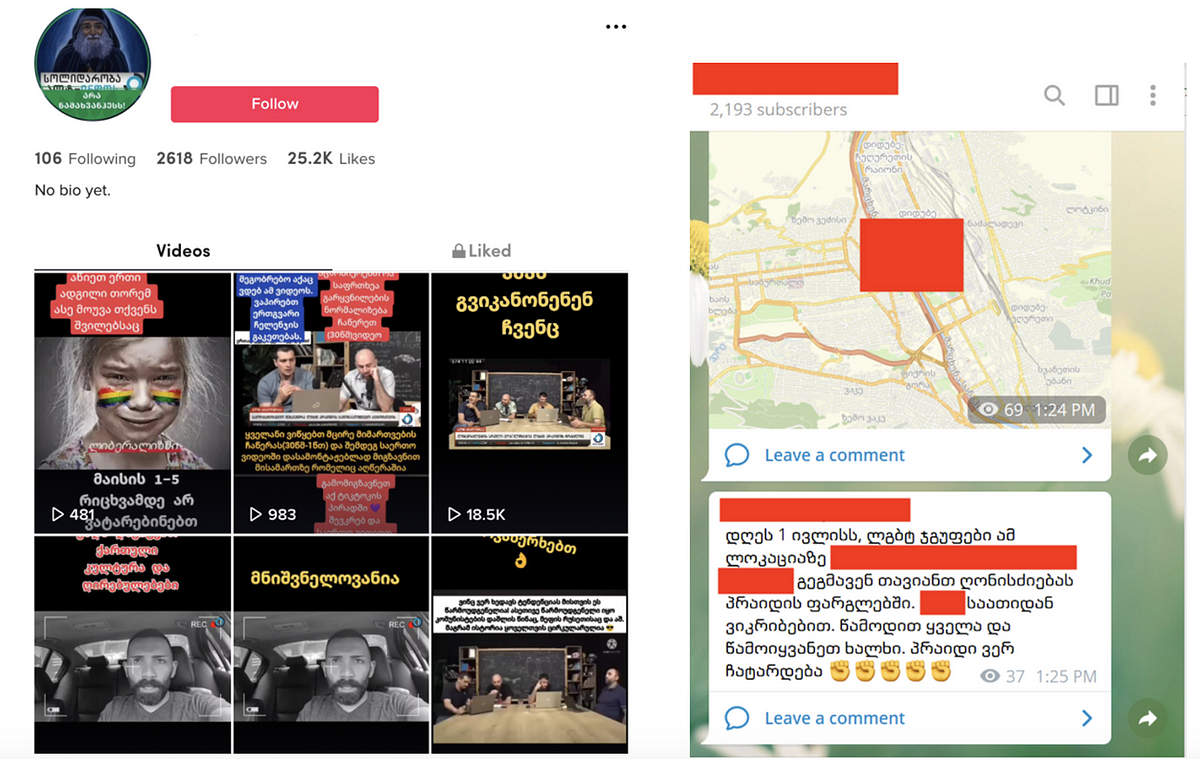
Media Development Foundation (MDF), a local organization countering disinformation, collected cases of calls for violence and threats prior to Pride Week and the March for Dignity. Among the incidents highlighted by MDF, during a program aired on June 30, 2021, Alt-info’s Makharadze said that he was an oppressor and was going to defend his homeland with force and violence. This program had almost 13,000 views on YouTube as of July 20, 2021. Similarly, Konstantine Morgoshia, one of Alt-Info’s founders, announced Alt-Info’s plans, admitting that the group was mobilizing people and warning that nobody would be able to protect activists in the streets. Morgoshia was also the lead instigator who called on radical groups to storm the Shame Movement’s office because of its connection to Tbilisi Pride.
This footage shows how the violent groups, by the leadership of Konstantine Morgoshia, planned attack on the HQ of Shame Movement on 5 July. Morgoshia has connections with pro-russian far-right media platform #Altinfo. He hasn't been prosecuted yet.#TbilisiPride21 @Shamemovement pic.twitter.com/tvZNaI16JA
— Tabula Media (@Tabula_Media) July 15, 2021
Publika, an online media outlet, published a video using footage from TV channels and Facebook livestreams to illustrate chronologically how the mob had gathered in front of the Shame Movement’s office within 10 minutes following Morgoshia’s appeal.
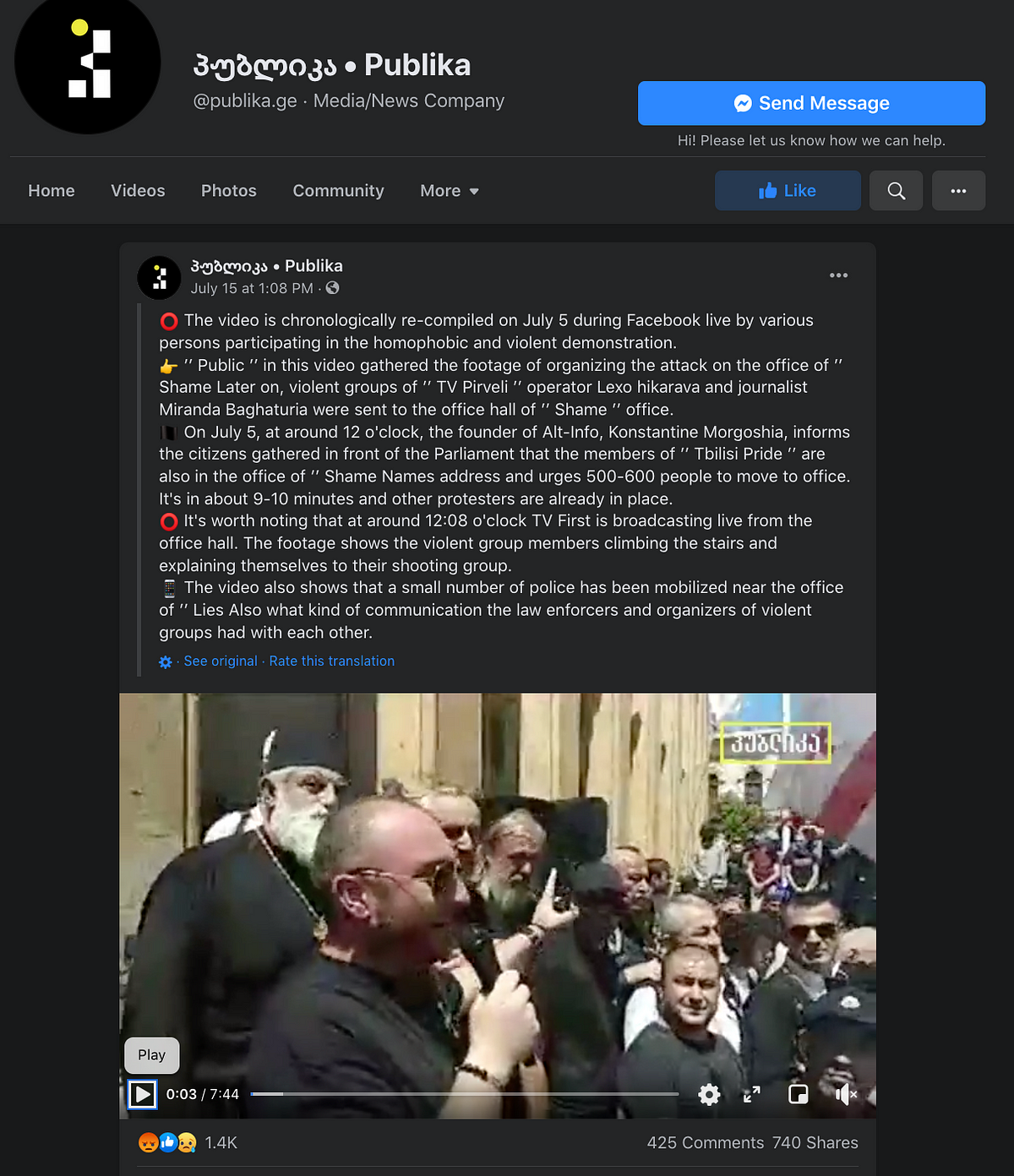
It was at the Shame Movement office where Lashkarava and another TV Pirveli journalist were severely beaten. On the one hand, Publika’s video demonstrates not only that TV Pirveli’s journalists were in fact alone with the mob inside the building with only one policeman, but also showcases that it was members of the police force who initially opened the entrance door of the Shame Movement office building for the violent mob.
Alt-Info’s Kremlin alignment
While the DFRLab found no evidence of the Kremlin itself being involved in attempting to stoke the violence, Alt-Info has a history of alignment with the Kremlin’s outlook on its neighbor Georgia.
Open source evidence, including links between the actors behind the July 5 violence and coordinated disinformation narratives, demonstrates that it was not simply the mobilization of domestic homophobic groups, but a well-organized action against LGBT community, CSOs, western embassies and Georgia’s Euro-Atlantic aspirations in general.
Alt-Info is linked to a number of pro-Kremlin Georgian actors: Morgoshia, for example, is a former leader of Georgian March and a former member of Alliance of Patriots, both of which are far-right pro-Kremlin political parties. Morgoshia is also a close friend of Vasadze (mentioned above), who is a Georgian representative of the World Congress of Families, a pro-Kremlin network of organizations that promotes an anti-LGBT agenda around the world. For his part, Vasadze has strong links to Aleksandr Dugin, a leader of the Eurasia Movement, a pro-Putin organization often described as fascist in nature.
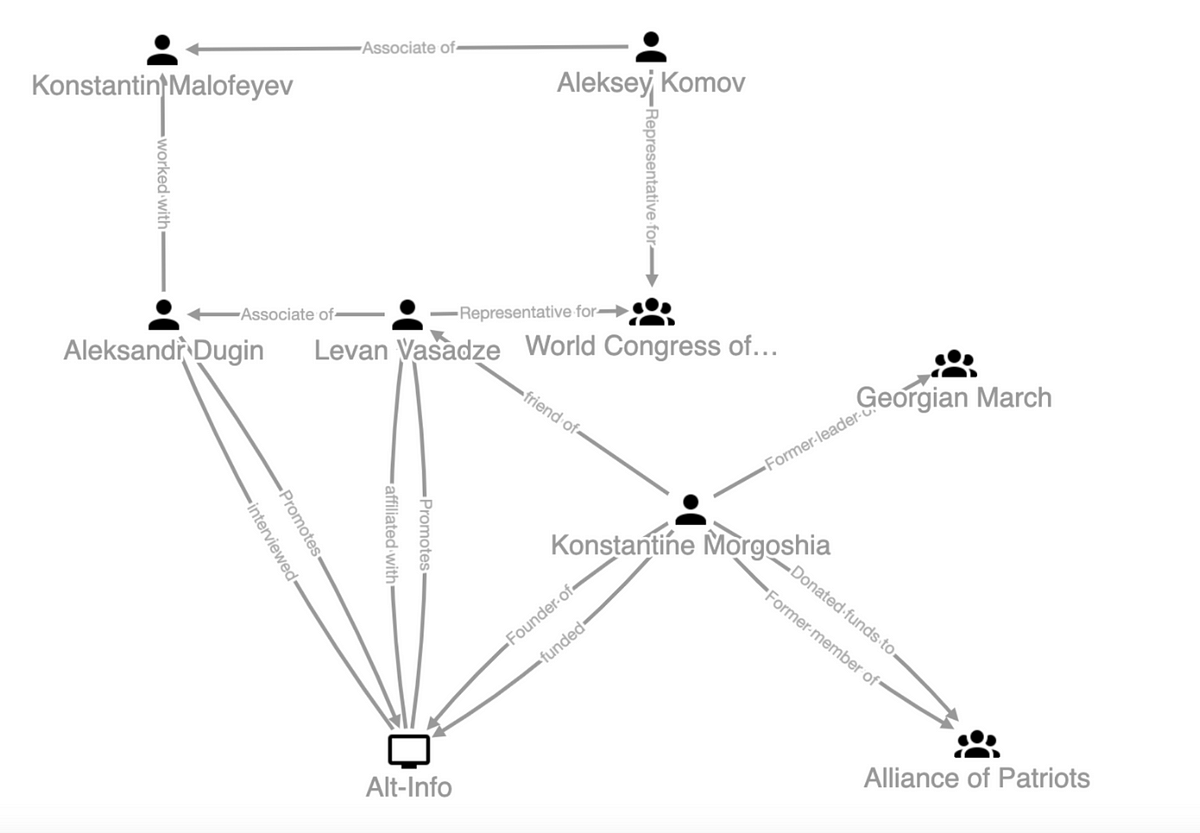
Before, during, and after the violence, Dugin has promoted Alt-Info’s content on his personal Facebook account, including sharing footage of assaults on July 5–6 and the mob’s removal of the EU flag, captioning the latter with “Georgia I admire.” Dugin also promoted Alt-Info’s crowdsourcing campaign for additional funds and, in this vein, reposted information about Makharadze’s bank account to which people could contribute.

On July 12, Dugin posted, in reference to the hate groups that perpetrated the violence, that Georgians were changing the world balance to Russia’s benefit. This post was subsequently re-shared by Makharadze with the caption “And here [in Georgia] many do not even understand what we actually did,” thus implying that the events around the march aligned with Kremlin interests.
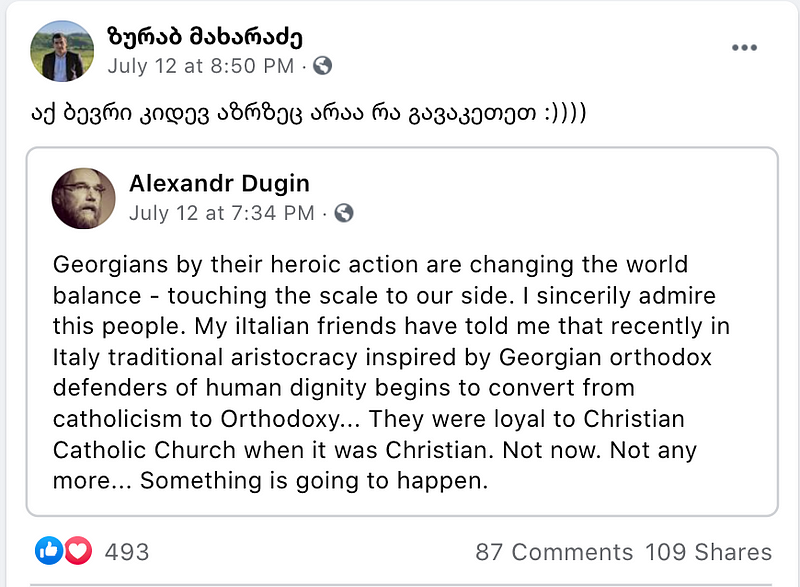
Another of the more notorious figures behind the violence was Dimitry Lortkipanidze, head of the Primakov Georgian-Russian Public Center, which was established under the Gorchakov Fund, an organization established by the Russian Ministry of Foreign Affairs and funded by the Kremlin to promote its interests worldwide. The Primakov Center maintains an official partnership with the Russkiy Mir Foundation, which was established by decree by Russian President Vladimir Putin. Members of its Board of Trustees include high-ranking Russian officials.
Following the events of July 5, Alt-Info’s anti-Western rhetoric became more open and assertive. Among other things, in videos posted online, some of the group’s leading personalities stated that the process of Georgia’s EU aspirations had been turned upside down; that Christian conservatism would replace liberalism; and that the burning of Western symbolic flags should be normalized. In another video, Alt-Info host Shota Martinenko can be heard saying in Georgian, “The burning of the EU flag is an event of a special significance… This has to be normalized and transformed into a fighting mechanism. This practice has to be established.”
Ahead of Pride Week, the anti-Western character of the rhetoric could also be seen in the narratives disseminated by the Georgian Orthodox Church, which is known for its ultra-conservative positions that often align with Kremlin interests. In its official statements, the church targeted Western institutions and embassies, particularly US Ambassador Degnan and the EU generally. Representatives of Orthodox Church and members of Alt-Info also claimed that the United States was “pursuing the moral occupation of Georgia” and imposing “colonial administration” over Georgia. In the same video, Russia was portrayed as defender of traditional values and Georgian identity.
In addition, the Facebook page for the Georgian Patriarchate’s TV channel “ერთსულოვნება” (Unanimity) has promoted Alt-Info’s content, calling on people to follow the group’s various social media channels.
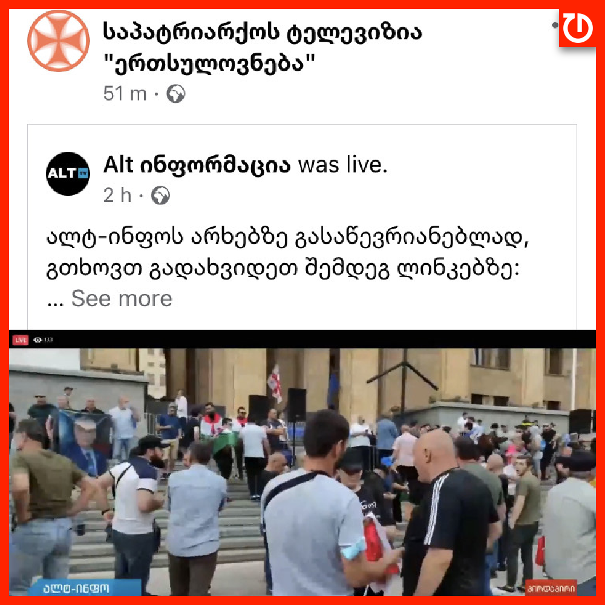
According to GRASS, a counter-disinformation organization in Georgia, pro-Kremlin hate groups and representatives of the Georgian Orthodox Church mainly disseminated narratives against the West that echo the Kremlin’s anti-Western rhetoric. Among the narratives being spread were that the goal of Pride Week and the March for Dignity was to fight against Georgian identity, traditional values, and the Georgian Orthodox Church; that, because of Pride Week and the March for Dignity, Georgia would lose its occupied territories; and that the West imposes LGBT Pride. Arguing that the country needed to defend its traditions from Western influence, one representative of Georgian Orthodox Church openly called on violence in the streets asking violent groups to “use force for the homeland.”
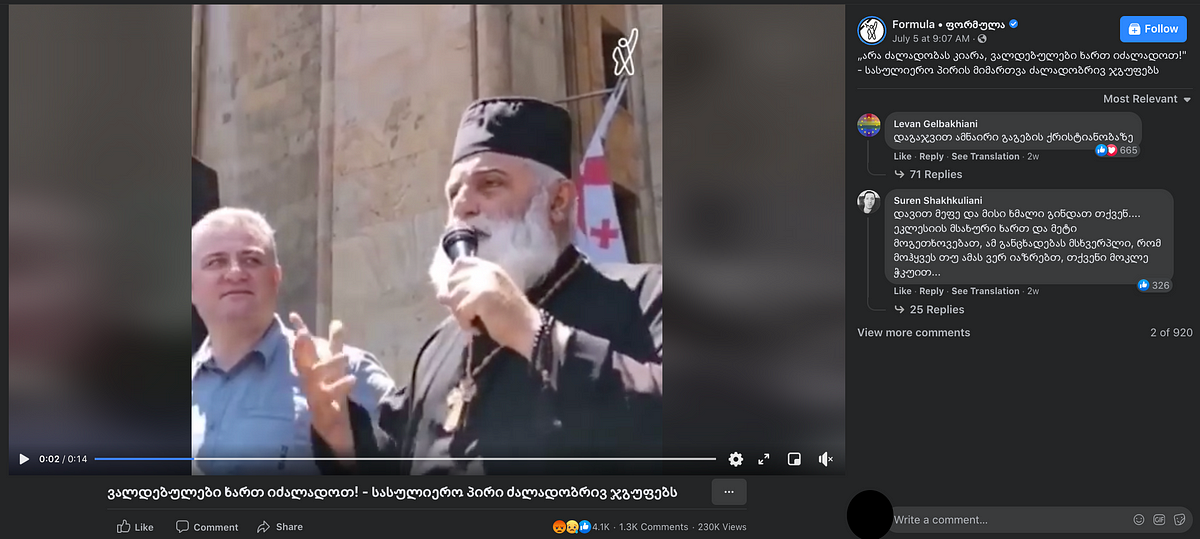
To support their rhetoric, ultra-conservative Facebook pages disseminated out-of-context information about violence against Pride in other countries, implying that their followers would be excused if they too resorted to violence.
Facebook group ეროვნული ჯგუფი (“National Group”) posted one such claim, which had been shared around 3,000 times as of June 17, saying that police in Ukraine had refused to protect Pride activists. The post contained two misleading elements, as highlighted by MDF’s MythDetector. First, the claim about Ukrainian police refusing to protect was incorrect, as the police officers who refused to protect Pride participants in Kyiv — in 2016 — had been fired before that year’s event. Second, the post was accompanied by an image depicting anti-LGBTQ protesters burning the LGBT flag and portrayed as if it was recent, but the photo was in fact from the events around Kyiv Pride in 2017.
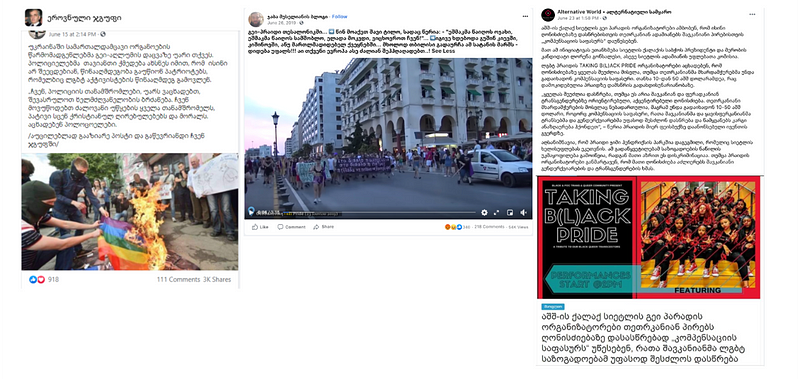
In addition to the above pro-Kremlin Georgian actors, 60 минут (“60 Minutes”), a program on Kremlin-run state TV channel Россия 1 (“Russia 1”), endorsed the anti-LGBTQ violence. The anchors of the program stated that (the violent groups) “let queers know that Georgians consider the latter bigger disaster than the coronavirus.” The anchors’ assessment of the footage showing violence in Tbilisi was that “(the audience) have seen how normal people celebrate the disruption of gay parades.”
Conclusion
July 5 represented the latest in far-right attacks on democratic values in Georgia, this time with Pride Week and the March for Dignity as a backdrop. Anti-LGBTQ protesters attacked journalists and activisits, stormed the offices of the organizations facilitating the Pride Week events. The country aspires for closer Euro-Atlantic integration, but such violent activities have hampered those same aspirations. Calls online led to real-world violence, and the Georgian government’s insufficient response — to put it generously — led to tragic offline consequences, with multiple people injured and — a death.
This article was made possible by the generous support from the US people through United States Agency for International Development (USAID) via Georgia Information Integrity Program (GIIP). GIIP is implemented by Zinc Network and its partners, including the DFRLab. The views expressed in this report may not necessarily reflect those of USAID or the US Government.
Cite this case study:
Sopo Gelava and Eto Buziashvili, “Online calls for attacks against Georgia’s LGBTQ community result in offline violence,” Digital Forensic Research Lab (DFRLab), https://dfrlab.org/2021/07/23/online-calls-for-attacks-against-georgias-lgbtq-community-result-in-offline-violence/.

